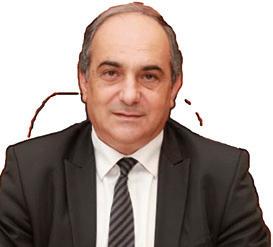
28 minute read
Michael Zampelas (1937-2019
MiChAel ZAMPelAS
(1937-2019) AN APPReCiATiON
By Theodoros Philippou
Michael (‘Michalakis’) Zampelas was born in the village of Palaichori on March 19, 1937, one of the nine children (five boys and four girls) of Herodotos and Maria Zampelas. In September 1950, on the advice of his father, he moved to Nicosia where he completed his secondary education at the Higher Commercial Lyceum. As a student, he met Loukia, the daughter of Christofi Roditis and, on September 7, 1958 they married and would have three daughters - Koula, Maria and Irene. Immediately after getting married, they went together to London where he studied for the professional qualification of the Institute of Chartered Accountants in England and Wales. Shortly after qualifying as a Chartered Accountant in 1966, he and his family returned to Cyprus. Initially employed in the Nicosia office of Price Waterhouse Peat & Co. he became one of the first members of the Institute of Certified Public Accountants of Cyprus (ICPAC). After a short period of service, he moved to join as a partner in the local accounting firm Ioannou Zampelas & Co. in Nicosia. In 1970, together with his associates, Michalakis established Coopers & Lybrand, an international accounting and consulting firm, in Cyprus. Following the international merger of Price Waterhouse with Coopers & Lybrand in 1998, a new firm named PricewaterhouseCoopers (today’s PwC) was formed. He served as Chairman and Chief Executive Officer from its establishment until 2001 and as non-Executive Chairman from 2002 to 2005. Today, PWC in Cyprus employs around 1,000 partners and staff and is the leading professional services firm on the island. Michalakis started from zero and after the ‘tsunami’ created by the Turkish invasion in 1974, he envisioned what appeared to be an inconceivable task: to develop Cyprus as an international business centre, exploiting the only elements that the Turkish invasion had not managed to destroy: the quality and professionalism of its people. To this end he worked tirelessly and with absolute success, making a major contribution to the country’s economy. He can rightly be considered as “the father of international professional services in Cyprus”. He left his mark, not only on the development of the accounting profession but also on the development of an entire sector of the economy, which continues to be a major contributor to Cyprus’ progress. He served as President of the Institute of Certified Public Accountants of Cyprus (1976-1978) and as Chairman of various Institute committees. In 2010 he was honoured by the Council of the Institute for his remarkable contribution to the development of the accounting and audit profession and to the economy of Cyprus. After retirement, his love of Cyprus and of its capital Nicosia, in particular, led him to stand as an independent candidate for the post of Mayor of Nicosia. He won the municipal elections and served as Mayor of Nicosia from 20012006. His contribution to the advancement and cultural development of Nicosia during his term of office was considerable. He loved the city and he believed in its potential and prospects. He initiated the design and execution of major development projects, including the redevelopment of Eleftheria Square, the construction of the new City Hall and the renovation of the Municipal Theatre. He also had a sincere understanding of, and sensitivity to, the problems of the Municipality and its citizens and he strove with passion to resolve them, working hard and methodically for the city’s progress and modernization. He demonstrated that technocrats can perform excellent work from what are traditionally considered as political positions. In 2007, he was honoured by his successor and the Municipal Council for his services and awarded the Gold Medal of the City of Nicosia. Michalakis and his wife Loukia were great lovers and collectors of art and it was this that prompted them to create the Loukia and Michael Zampelas Art Museum, a not-for-profit private organization, which houses the family’s permanent art collection and organizes temporary exhibitions by artists from Cyprus and overseas. Moreover, other art-related ventures were established under the Zmart brand name: Zmart Education, Zmart Gallery, Zmart Shop, Zmart Café and Zmart Framing. At an extraordinary meeting on May 16, 2019, the Nicosia Municipal Council decided to rename the street in Kaimakli, where his home and Art Museum are located, as Michalakis Zampelas Street. His contribution to the cultural community and the business sector continued to the very end of his life. He served as Chairman of many social institutions, including the Association of Friends
of the Christou Steliou Ioannou Foundation for children with special needs, the Cyprus Foundation for Muscular Dystrophy Research and the Cyprus Institute of Neurology and Genetics (CING). He has also served as President/Chairman of organizations such as the Cyprus Russian Business Association, the Cyprus Ports Authority and the Cyprus Forest Industries. He was the Honorary Consul of Estonia in Cyprus from 1997 and he contributed to the development of commercial and cultural relations between the two countries and was honoured by the President of Estonia in recognition of this. In every positions and office that he held, Michalakis left the mark of his strong personality and the proof of his contribution. He combined great vision with a passion for creation and, through good organization, systematic work and effectiveness, turned his ideas into projects. He had a unique ability to connect with the people around him, stimulating their full potential. He was an excellent leader and communicator, characterized by a mildness of style and purity of thought. He was a demanding person, setting high standards – first for himself – and always willing to support those who sought his help. He knew how to support and encourage as well as to advise and guide. He listened carefully to others and respected their opinions. In the end, however, he took the decisions and implemented them, gaining the recognition and trust of his associates. According to Loukia, Michalakis was an exemplary husband, father, grandfather and brother. His hard work and dedication to duty and his family were the greatest legacy to his children and grandchildren. I was linked personally with Michalakis through a sincere friendship from the age of 12, when we both in the same year at the Higher Commercial Lyceum. Following the merger of Coopers & Lybrand with Price Waterhouse in Cyprus, I also worked with him professionally, the two of us enjoying great mutual appreciation and respect. I would say that Michalakis possessed charismatic talents and exceptional abilities. His life was marked by many important milestones. It was a life based on selflessness, charity and kindness. He was blessed to have an interesting life, full of challenges, achievements and offerings. Throughout his life, Michalakis had the support of Loukia, an exemplary lady who shared the same noble feelings for people, society and art. Loukia, her daughters Koula, Maria and Irene, and her eight grandchildren, can all feel proud of Michalakis. His passing leaves the indelible memory of a great public personality who consistently and unselfishly served his country, society, the cultural scene and the professional and business world.
Michael Zampelas passed away on May 15, 2019 at the age of 82 after a short illness.
DATA CeNTeR SOlUTiONS fOR fiNANCiAl SeRviCeS fiRMS
Written by Peter G. Economides, Chairman and CEO of CL8
Successful financial services and banking organisations must find new ways to compete in an increasingly complex industry. Nowadays, financial services firms rely heavily on IT systems for optimal uptime, security, connectivity and data integrity. Strict regulations and compliance rules within the finance industry make it even more difficult for firms to address security, business continuity and customization. This is why they turn to Data Centers for indisputable security, compliance and efficiency. Financial firms must be able to protect customers sensitive data and proprietary company information. Managing sophisticated applications and IT infrastructure requires scalable, innovative and reliable Data Center solutions. Cyprus is catching up in this respect. A Data Center should offer enhanced security measures, including vulnerability scanning, network and web application firewalls, log management and threat detection, antivirus and anti DDoS services among others. It should also have 24/7/365 onsite personnel and CCTV monitoring. It should, additionally, ensure that security and operational procedures are regularly reviewed and tested by an independent certified auditor. The purpose is to validate that the controls and processes meet stringent criteria regarding security availability, process integrity, privacy and confidentiality. CL8 does all above. Moreover, companies offering financial services manage large volumes of customer and transaction data that customers need to access, at all times. This requires fast and reliable connectivity to support latency, sensitive applications for activities such as payment processing, market data delivery and online trading. These companies cannot afford any of their systems go down. Being Tier III certified by the Uptime Institute of the USA, guarantees that services offered by CL8 are available 24/7 while the uptime of these services is rated at 99.982%. CL8 is the only Data Center in Cyprus that has this certification offering Hosting, Collocation and Cloud services. The ISO 9001, ISO 27001, and PCI DSS certified Data Center, ensures uninterrupted internet connectivity, providing servers and networking equipment in the form of IaaS and Cloud services, providing solutions to compete successfully in this increasingly complex industry. At last, Cyprus has a state-of-the-art Data Center with highly qualified local professionals to help financial services firms remain agile while, at the same time, meeting the industry’s growing compliance requirements.
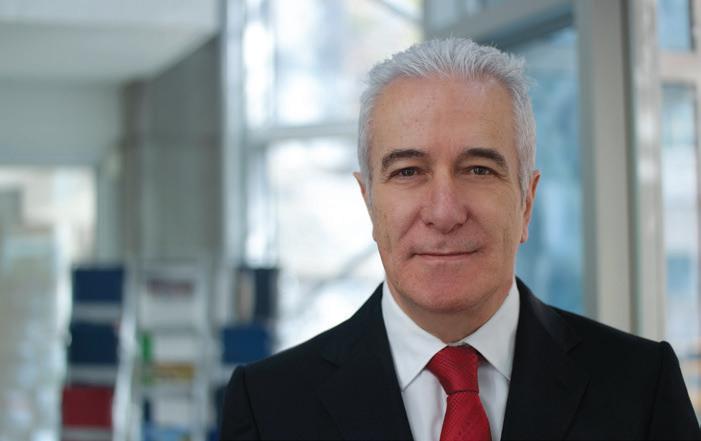
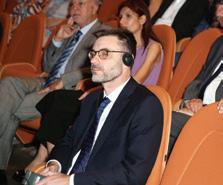
A New Image and Presence for ICPAC



he Institute’s 58th Annual General
TMeeting, which took place at the Nicosia Municipal Theatre on 26 June was used, among other things, to present ICPAC’s new logo and its rebranding strategy. Outgoing President Marios Skandalis explained that the new, modern logo reflects the changes and new approaches being adopted within the Institute itself. “We would not be consistent and trustworthy in asking for modernisation and reform without first putting our own house in order,” he said, adding that, “Today, we can announce that ICPAC is turning a page. It has implemented significant changes and we aim to create a new image for this new era.” Skandalis clarified that the changes are not merely decorative or a way of “freshening up” ICPAC’s public image. “This renewal is substantial and reflects ICPAC’s diverse and dynamic activity and perspective. The change of logo is part of the Institute’s strategic planning for the period 2019-2021 and is in line with our strategic goals and our clear intention for a more active and dynamic intervention in both the profession and in public affairs” he said. He went on to say that the economy needs a new Master Plan, which should include the following:
1. Financial Stability
“It is necessary not only to continue fiscal stability but also to further restructure the public and wider public sector.”
2. Private Sector
“It is necessary to continue the policy of providing incentives in vital sectors of the economy in order to boost business activity and increase private investment. Without the active involvement of the private sector, we cannot look forward long-term growth.”
3. Taxation
“We believe that the time has come for a serious revision of our tax system so that it better meets current and future conditions and needs.”
4. Attracting Investment and Business
“It is necessary to continue and strengthen the effort to attract foreign investment and business to Cyprus. We must properly and effectively promote the country’s comparative advantages.”
5. Enrichment of Services
“Cyprus has the potential and comparative advantages to become a regional services centre. Sectors such as professional services, health, education, research, innovation, shipping and others can contribute to this targeted effort.”
6. Business Centre
“The attractiveness and credibility of a business centre are earned with hard work, consistency and excellent behaviour and conduct. In particular, when the business centre is based on the principles of good governance and business ethics. We still have a long way to go to reach the desired levels, which implies a holistic change of our culture as a business community.”
7. Research – Innovation – Technology
“The 4th Industrial Revolution has forced all economies to focus on the development of research, innovation and


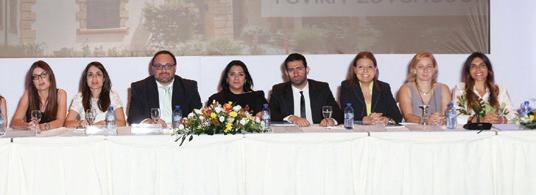
NEW COUNCIL
the new generation of artificial intelligence technologies. Cyprus, unfortunately, has taken very small steps in this area and is well behind other European states and its competitors. We welcome the Government’s decision to promote a specific national plan for research and technology, but we stress the need to give greater importance to these areas, with more involvement of the private sector and businesses. “
8. Modernization of the structures and operations of the State
“We need a general ‘facelift’ to make the State more flexible, more productive and more people-friendly. The changes required are at all levels of the State, otherwise the whole system will not work. All its services need to be modernized and operate uniformly and evenly on a centralized basis.”
9. Energy
“The energy sector is increasingly taking a place at the heart of our economy. With the gas discoveries, with the new drillings planned and the many energy infrastructure projects, we believe that the energy sector will give a new impetus and dimension to the Cypriot economy. Dealing with Turkey’s unacceptable and illegal provocations is a one-way street for any strategy to exploit our natural resources. With such a development, Cyprus could be transformed into a regional energy centre with huge international economic interests. That is why we need to make timely decisions to extract and commercialise our natural gas and go ahead with the practical promotion of our country’s energy prospects.”
10. Mentality – Culture
“Narrow-minded attitudes and perceptions regarding employment, reform and development need to be eliminated. We have an obligation towards the next generation to leave behind distortions and obsessions and to look forward to adopting a new, modern culture.”
Skandalis added that Cyprus, as a small and open economy, “is vulnerable to fluctuations or instabilities on the international financial scene, such as Brexit, financial and institutional problems in Europe, the emerging US-China trade war, economic imbalances, day-to-day monetary fluctuations, geostrategic and geopolitical developments and more. Therefore, the country has to be shielded from any shocks from the outside environment.”
A new council was announced on July 1. Marios Skandalis stepped down and Demetris Shiakallis is a new member. The remaining members will remain in office for the period 2019-2020.
The new Council is as follows:
President: Demetris S. Vakis
Vice-President: Pieris Markou
Secretary: Maria Pastellopoulou
Members: Nicos Chimarides Odysseas Christodoulou Gavriel Onisiforou Stavros Pantzaris Petros Petrakis Savvas Poyiadjis Demetris Shiakallis Spyros Spyrou Demetris Taxitaris Christos Vasiliou Karlos Zangoulos

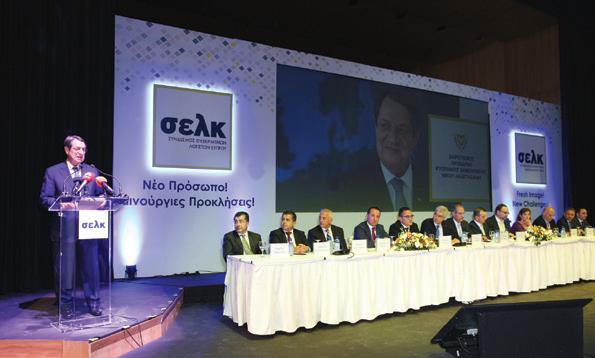
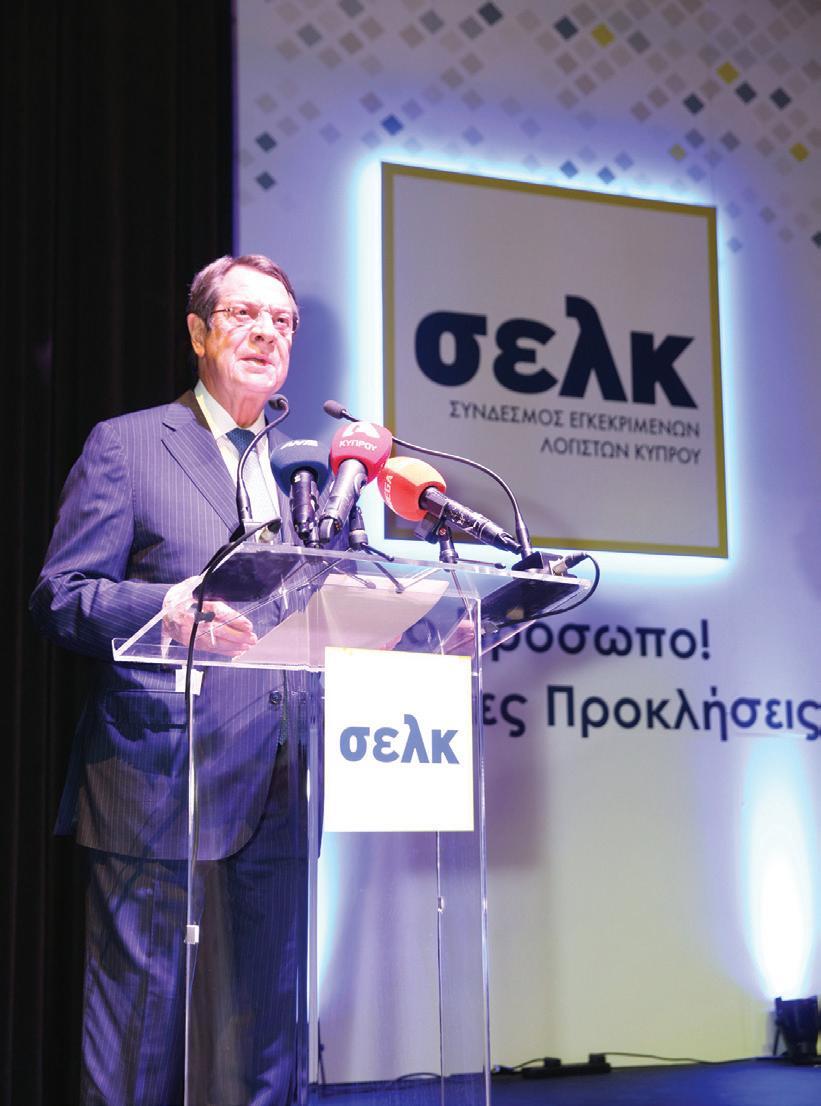
Government Reform Programme
President Nicos Anastasiades spoke at the Institute’s Annual General Meeting and, in addition to praising the past, present and future role of ICPAC, explained the pending reforms that the Government is determined to implement.
resident Nicos Anastasiades told
Pthe 58th Annual General Meeting of ICPAC that his presence should be seen as tangible proof of his appreciation and recognition of the Institute’s longstanding contribution, which has been of crucial importance to the growth and improvement of the Cyprus economy. “Through its close cooperation with the State and the active involvement of its members, ICPAC has contributed to the increased prosperity of the country, significantly reinforcing local economic activity and job creation,” he said. He described the Institute as “a trusted ambassador of the country”, noting its role in promoting the country as a highquality international services centre and helping attract considerable investment. The President underlined the fact that ICPAC was the first organisation with which the Government recently signed a cooperation agreement through the Ministry of Foreign Affairs with the aim of conducting effective economic diplomacy. He also praised what he called “the Institute’s particularly important and multifaceted contribution to the efforts made to overcome the recession and to the economic revival and sustainable growth that the country has enjoyed in recent years. President Anastasiades also drew attention to 14 government policies aimed at reform in a number of sectors, and stated his belief that ICPAC will play a key role in their implementation. The policies refer to:
1) Public sector reform. Originally rejected by the House of Representatives, this will be presented in a new bill, with which he hopes to finally rid the public sector of bureaucracy. 2) Full digitization of key services through e-Government, as well as the creation of a Deputy Ministry of Digital Strategy, Research and Innovation 3) National plan for the adoption of Blockchain technology. 4) Drastic reform and modernisation of the justice system. 5) Full implementation of the National Health Scheme. 6) Local government reform. 7) Full implementation of the National Tourism Strategy. 8) Simplification of the licensing processes for major investments. 9) Development of the Investment Funds sector. 10) Implementation of the National Rural Development Plan. 11) Transformation of Cyta into a private company, enabling a strategic investor/partner to play a role; privatisation of the Cyprus Stock Exchange and the National Lottery.
12) Reform to the governance struc-
ture of the Central Bank, reinforcement of CySEC and the establishment of a new independent monitoring authority for the Insurance sector and Provident Funds. 13) Overall reform of the education system, including the recruitment process for teachers. 14) Increased productivity through the strengthening of employee skills and the production of innovative, upgraded products.
Second Time Around
Demetris Vakis was recently elected President of ICPAC for the second time in four years. Here he talks about the Institute’s changing role and objectives as well as the past accomplishments of the Institute.
You have just been elected President of ICPAC for a second time. Did you propose yourself for the position? How do you feel about taking on this important role once again?
No, fellow Council members proposed my name. In the absence of other nominations, the Council elected me as President. As you rightly pointed out, this is an important role for the profession and I am deeply honoured by the trust shown in me. Naturally, the President of the Institute is seen as the representative of the accountancy profession. As such, the responsibility to act and respond to challenges and changing circumstances is great. Even though I represented the profession in the recent past and gained invaluable experience, current and anticipated challenges will require new ideas. Therefore, I feel that significant time and effort will be invested once again in this important role. In my view, the President must be as hands-on as possible in order to be effective and this is what I will strive to do.
What do you hope to achieve as President of ICPAC? Are there things that you didn’t get the chance to implement during your first term or do they not really depend on who is President of the Institute?
During my previous presidency (2015-2017), ICPAC developed for the first time a mission and a strategy. These were revisited in 2018. One of the outcomes was an internal reorganisation and the establishment of additional functions. Now the Institute is in the process of implementing many of the actions outlined in the strategy. Therefore, one of the priorities is to complete the enhancement of its operational capabilities and its services to its members. Another focus area will be technology – both as it concerns the Institute, but also as it relates to its members and the economy. To this end, we will be reviewing ICPAC’s internal systems and processes with the aim of automating more activities and empowering our members in their dealings with their Institute. We have also established a new Committee – the Committee on Digital Transformation and Technology – which will aim to assist members and enterprises at large in adopting new technologies and improving operations. Other significant aspects which are being addressed include the impact of Brexit on our profession and the future of Cyprus as an international business centre. Relationships and cooperation with local and international stakeholders are always high on the agenda. These include the Ministry of Finance, the Ministry of Energy, Commerce & Industry, the Cyprus Public Audit Oversight Board (CyPAOB), The Tax Department, CySEC, the Central Bank of Cyprus, the House of Representatives, other Commissions, the Cyprus Bar Association, the Cyprus Stock Exchange, OEB, the CCCI and a host of other professional associations and bodies in Cyprus and abroad. Finally, the Institute has a long-term mission which the Council and Management adhere to. It is also true that the President plays an instrumental role in ensuring that the decisions and actions of ICPAC are appropriate in furthering its objectives and in providing direction during times of change.
Besides the new board, ICPAC also presented its new logo during the 58th Annual General Meeting at the Nicosia Municipal Theatre. Does this mean a change of image for ICPAC? What’s the thinking behind it?
ICPAC was established 58 years ago and, as its role in the economy changes, the way it presents itself also changes. If I remember correctly, the last change in the logo was effected at its fiftieth anniversary. The Council considered that a refreshed logo was important, as the Institute over the past four years expanded its reach and cooperation locally and overseas and the new logo is considered to be more in tune with current international trends. ICPAC is enjoying an excellent image locally and internationally. The refreshed logo aims to capture and project this renewed and expanding presence.
How would you describe the importance of ICPAC in the development of the accountancy profession in Cyprus? Has the Institute’s role changed over the years? If so, in what way?
ICPAC is the only body of accountants which is recognised by the Council of Ministers. As such, it plays an institutional role,
in other words it is responsible for the monitoring of its members as they abide by a number of laws and regulations. In addition, through a delegation agreement with the CyPAOB, the Institute monitors the audit profession, other than the auditors of Public Interest Entities (PIEs), who are monitored directly by the CyPAOB (based on EU and Cypriot law). Over the years, ICPAC broadened its support to the profession, by developing specialised committees to address policy and technical matters in order to assist members who offer a wide range of services to, or work in, all segments of the economy. It is the first line of support for the professionals and its depth of expertise in many areas allows the profession to play a leading role in introducing new ideas and practices.
How would you assess ICPAC’s broader contribution to the economy and society overall?
The Institute has close to 5,000 members and is arguably the biggest and most organised professional association on the island. I believe that ICPAC has transcended the realms of the accountancy profession and acts as the de facto point of reference for new ideas about matters pertaining to the economy, taxation, related legislation and other relevant areas. During the economic crisis and ever since, many institutions, including the Troika, Moneyval, credit rating agencies, EU and US delegations and foreign correspondents, have sought ICPAC’s views on a wide spectrum of topics. Members of the Institute accompany government-led delegations abroad and participate in negotiations for the establishment of Treaties such as those for the Avoidance of Double Taxation; Ministries, government departments and the House of Representatives seek ICPAC’s views on a wide spectrum of issues. Recognising this broader role, ICPAC’s mission has been enhanced to take into account, where relevant, the wider public interest.
What are the main challenges facing the accountancy profession today and how can ICPAC help its members deal with them?
The profession has always faced challenges and has adapted to the circumstances. Current challenges include increased regulation and enhanced monitoring, the potential impact of technology on traditional work practices and possible new competitors, changes to European and global regulations concerning taxation and the associated comparative advantage for Cyprus, the elimination of boundaries in the global digital economy and the ability to attract new business to Cyprus and to offer novel value-adding services. For accountants who lead businesses in other sectors of the economy, the challenge of sustainable and profitable development and growth is a major one, having regard to the size of the economy and the present tight capital environment. ICPAC is refocusing its various topicspecific committees to be in a position to address as many of these challenges as possible. In addition to the Digital Transformation and Technology Committee, it is establishing a new Economy Committee, to provide a wider perspective to ICPAC’s assessment of the economic environment. Additional professional staff will be employed to facilitate and support its members and it is extending its training alliances in order to offer opportunities for more in-depth training and development of new skills.As always, the Institute will be active and proactive.
What do you see as the main opportunities and challenges for the accountancy profession in the next 3-5 years?
I outlined above some challenges; there are a number of opportunities which, if the profession succeeds in grasping, they may create benefits in the medium and long term. One example is Brexit: ICPAC may be in a position to provide support and offer a roof to students and members of UK Institutes, enhancing the international standing of Cyprus within the profession. As mentioned before, the global digital economy has transcended physical boundaries. Cyprus, as an island, now has an immense opportunity to capture global business in excess of its relative physical size. This is a huge challenge – and opportunity – for all of us, not just the accountancy profession. The efforts of the past few years and in particular those of CIFA, to develop the Funds and related services industry, offer another major opportunity to employ trained professionals. We need to be able to attract investment; however, this cannot be only in terms of funds – it must include the investment of time by those who want to establish operations here. Therefore, Cyprus must invest in the connectivity of the island with all major business centres in the wider region. This is crucial, not just for tourism, but also for all other service industries.
How do you think the founder members of ICPAC would view today’s Institute and the accounting profession in Cyprus?
I am certain that they would be – and those who are still with us, are – very proud and possibly surprised by the success of the profession in becoming one of the bedrocks of economic development. What started as an effort to create a forum for managing matters pertaining to professional accountants, blossomed to become the most successful profession in Cyprus. We owe it to those first pioneers that we continue to lead in improving our professionals, our enterprises, the economy and our society. ICPAC understands this well and sees this as its purpose.
Florin Toma
United We Stand
The Institute’s 58th Annual General Meeting was addressed by the President of Accountancy Europe, Florin Toma, who stressed the need for unity, not only among accounting professionals but among all European citizens, in order to make the most of the changes that are taking place across the EU.
“Many of you may not know Accountancy Europe so well, so allow me to share with you more about us. We are the umbrella organisation for the European accountancy profession. In addition to ICPAC, we represent 50 other institutes from 35 countries. But, as accountants, we work for people and people are central to Accountancy Europe’s mission and strategy. Because people count; at the end of the day, this is the message that we want to express, whether it’s to our members or to the EU Institutions. This is also why I would like to thank Kyriakos Iordanou and his team for representing ICPAC at European level; it’s always a pleasure to work with you. Whether it is in our Member Assemblies or our Expert Groups, ICPAC is an integral part of our decision making and we appreciate the perspectives that you bring to our work in Brussels. Cyprus
Ever since ICPAC joined Accountancy Europe, you have been such an active contributor and we greatly appreciate your continuous engagement on the European stage, especially as the accountancy profession in Cyprus is very prestigious. You are well respected for what you do, you are acknowledged as being central to how the economy works and participate in strategic debates. It is good to see that Cyprus values accountants for their strategic and important role affecting society as a whole.
Global focus
Your profession is also a very globally focused one, with Cyprus being at the forefront in adopting global standards. Just last month, the EU celebrated the 15th anniversary of Cyprus joining the Union. This was part of a major enlargement that meant closer cooperation across cultures and geographies. In the recent EU elections, Cyprus reaffirmed its commitment to the European Union. In this time of scepticism, it is very important that we stand united, whether as the accountancy profession or as Europeans. We believe that the future is brighter when we work together.
Our priorities
Following the recent EU elections, many new EU initiatives will affect the profession in all Member States. We are a single market, which helps the profession operate more effectively. This also means that 80% of the rules that professional accountants deal with on a daily basis come
from the EU. It is thus important that we are an integral part of informing the EU decision-making process at an early stage; rather than amending what is already proposed, we should be part of the agenda setting. Also, in order to remain relevant in influencing legislation, we need to be an innovative force. We cannot just bring our issues to the table but need to come with solutions to bigger public interest causes. Therefore, we have defined three priorities for the new EU mandate:
WE BELIEVE THAT THE FUTURE IS BRIGHTER WHEN WE WORK TOGETHER WHETHER WE LIKE IT OR NOT, TECHNOLOGY WILL FUNDAMENTALLY CHANGE HOW THE PROFESSION WORKS
1. Sustainable finance:
We are calling on businesses to redefine success to become sustainable, and the EU to leverage financial markets to transition to a sustainable economy. We are highlighting accountants as essential partners to build a sustainable financial system. 2. SMEs:
We believe that SMEs will succeed by embracing technology and looking for new business opportunities. The EU must unleash the potential of SMEs. As accountants, we are SMEs and we are also their key advisors in helping the European economy grow. 3. Tax:
We are urging policymakers to modernise taxation to respond to today’s social, environmental and digital challenges. The EU’s tax systems must meet the demands of a resource-constrained, online world. Accountants are crucial in this as they make tax systems work for taxpayers, tax administrations and society. The 4th and 5th strategic priorities for my Presidency relate to corporate reporting and audit and assurance. 4. Audit and assurance:
We know we will have our hands full with the review of the 2014 audit reform in the coming EU mandate. This is another area where a united European profession is more important than ever. The future of audit & assurance and especially of SME audit are also high on our agenda. 5. Corporate reporting:
In addition to our regular contributions to shaping IFRS, we need to focus on the importance of non-financial reporting. Accountancy Europe has led the Europewide debate on shaping the future of corporate reporting since 2015.
Future orientation
The world is changing around us. Whether we like it or not, technology will fundamentally change how the profession works. We cannot stop this. What we can do, is adapt. New technologies will automate much of the day-to-day work that accountants do. Just as when spreadsheet software became available, many thought that the accountancy profession would become obsolete. Not so. Because it was the expertise, judgment and knowledge that accountants brought to the task that made them valuable. It is the same today. We need to become strategic partners to our clients on financial matters, helping clients to make the right decisions for the sustainable growth of their business. Many of the most advanced firms are not only embracing technology but also expanding into new areas as well. IT audits, sustainability health checks and more. These require new skills and we will see the face of the profession changing as well.
Stronger together
I invite you to join me and Accountancy Europe in looking forward to the challenges and the opportunities which lie ahead – let’s make the best of them by working together. We strive to meet the needs of our members and also encourage them to grow. This is only possible by collaborating closely, as we do with ICPAC. I look forward to celebrating many future successes with you. Thank you very much.”
Demetris Syllouris
In his address to the 58th Annual General Meeting of ICPAC, the Speaker of the House of Representatives, Demetris Syllouris, noted that the profession has always contributed excellent advice to the House, enabling it to take the right decisions regarding the future of the economy. He thanked the Institute for its active involvement in the drawing up of the country’s national strategy on Blockchain technology. He also mentioned that, given the speed of technological and digital progress, it is essential to invest in understanding and developing these technologies for the benefit of the economy. He also spoke about Big Data and the use of cutting-edge technology in the audit function and urged the adoption of such technology throughout. He also promised that, in September, he will pursue an initiative to discuss, analyse and resolve all the issues of concern to the profession, including the formation of a strategy that will help change the image of Cyprus abroad.
